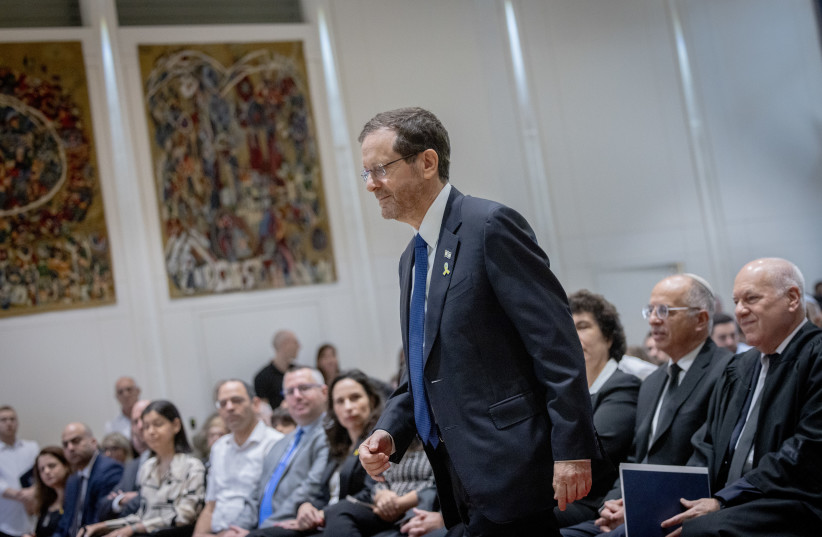At a ceremony for the appointment of 36 new judges and court registrars that took place at the President's Residence on Thursday, President Isaac Herzog, Acting President of the Supreme Court Uzi Vogelman, and Justice Minister Yariv Levin, each emphasized the importance of consensus in the justice system and in what goes on in the country in general.
Herzog, in underscoring the differences in backgrounds and political affiliations of the members of the Judicial Appointments Committee, stated that, nonetheless, they had succeeded in reaching an agreement on the 36 new judges.
Vogelman, acting president of the Supreme Court, is in that position only because Levin refuses to recognize the traditional system of age seniority in succeeding a Supreme Court president who has retired or died. As a result, there has been no successor to Esther Hayut, who retired in October 2023
The judicial reform still put on hold due to war
Levin's push for judicial reform was disrupted by major demonstrations that divided the nation. In addition, the issue of judicial reform was indefinitely put on hold due to the War of Iron Swords, which has been raging for just over six months.
All three speakers also made the point that even though the event was taking place in the shadow of war and bereavement, with 133 hostages still in captivity in Gaza, many fallen soldiers, and even more injured, it was essential for the judiciary to keep serving the public.

All three also expressed the wish that the 133 hostages would soon return, that soldiers would remain safe and that wounded soldiers would heal quickly. Condolences were conveyed to bereaved families. All this has become integral to speeches made at official events.
In emphasizing the significance of consensus, Herzog said that it was vital even if compromises had to be made here and there.
Vogelman said that too much time had passed for a decision to be reached on who should serve on the judicial appointments committee when there was a dire need for more judges.
He counseled the new judges to demonstrate integrity, to be fair, to listen carefully, and to treat all people as equals.
Levin was complimentary both to the new judges and to the members of the judicial appointments committee, naming each by name, including the representatives of the Supreme Court. He echoed the need for more judges.
In recent years, a conscientious effort has been made towards achieving gender equality in the appointment of judges.
This time, the number of male appointments was slightly in excess of those of females, though the number of female Arab appointments exceeded that of Arab males.
Nonetheless, the total number of Arabs more or less reflected the Arab ratio in Israel's demography.
This is not surprising as the key focus of appointments was the Haifa District Court followed by the Magistrates Courts, Family Courts and Traffic Courts in Haifa, Nazareth and the North – areas of Arab-Jewish co-existence and co-operation in business, culture, education and sport.
Vogelman and Levin each made it clear that Haifa is only the beginning of a series of judicial appointments that will be made in the coming months.
The main hall at the President's Residence was packed with families of the new judges, who had to get up very early in the morning for the drive from Haifa to Jerusalem as they had to be there by 8 a.m. in order to pass through a security inspection prior to the start of the ceremony which was at 9. They were rewarded with a buffet breakfast served under the pergola.
There were many more children present than in past years, leading to the speculation that younger judges are now sitting on the bench.
